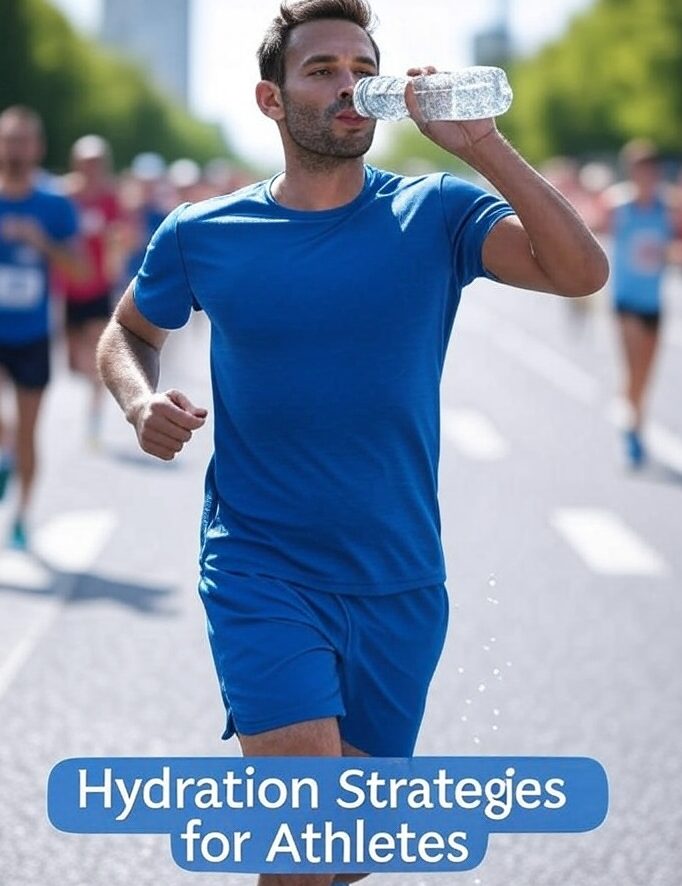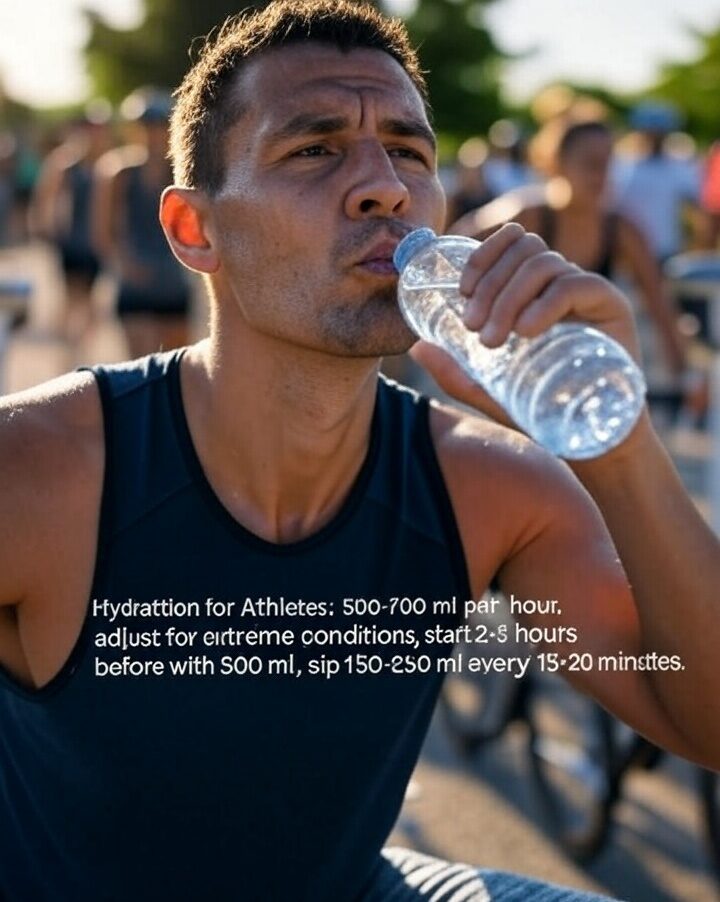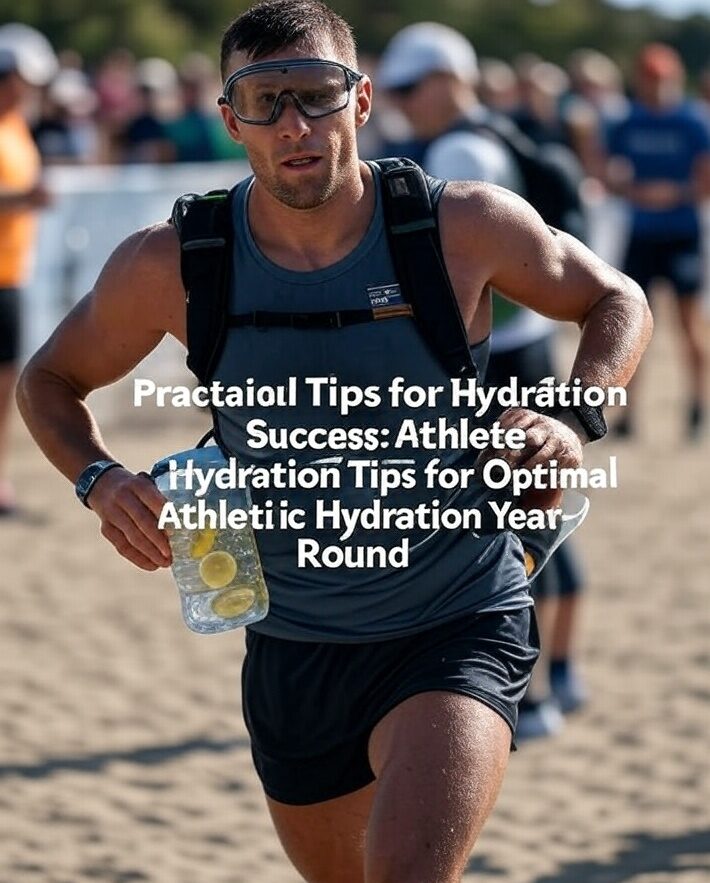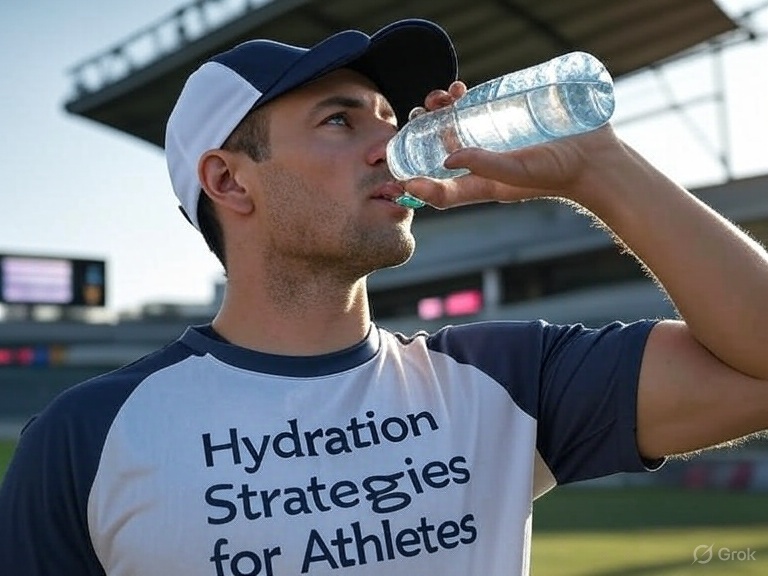Staying hydrated is a cornerstone of athletic success, yet many athletes overlook its profound impact on performance. Hydration for athletes goes beyond just drinking water—it’s about mastering timing, quantity, and selecting the right fluids to match your activity level. As a professional doctor and nutritionist with expertise in sport nutrition, I’ve witnessed how proper hydration can enhance endurance, prevent fatigue, and accelerate recovery, turning potential into peak results. For a broader perspective on fueling your performance, explore our Sports Nutrition Guide .
This article delves into effective hydration strategies for athletes, focusing on how much to drink, when to hydrate, and the ongoing debate between sports drinks and water. Whether you’re training for a marathon, powering through a gym session, or competing in a team sport, these insights will help you optimize your fluid intake for maximum performance.
Let’s explore the science and practical tips to keep you at your best. From pre-workout prep to post-game recovery, this guide has you covered. How do you stay hydrated during workouts? Share your habits below—let’s learn from each other’s routines!

Section 1: The Science of Hydration for Athletes
Proper hydration is essential for maintaining blood volume, regulating body temperature, and delivering vital nutrients to muscles during exercise. For athletes, even mild dehydration—losing just 2-3% of body weight in fluids—can slash performance, triggering fatigue, cramps, and reduced focus. Hydration for athletes involves replacing fluids lost through sweat, which can vary from 0.5 to 2 liters per hour depending on exercise intensity and climate conditions.
For a deeper dive into the science, check out the Gatorade Sports Science Institute’s Hydration Guide [External DoFollow Link]. The strategy is threefold: start hydrated, sustain fluid balance during activity, and rehydrate effectively afterward. I’ve studied how even subtle dehydration impacts strength and concentration, underscoring why hydration for athletes is a critical focus for optimal athletic hydration.
This process begins with understanding sweat rates and adjusting intake accordingly. Electrolyte balance is key, as sodium and potassium losses can disrupt muscle function if not replenished. To learn more about electrolyte-rich diets, see our Guide to Essential Nutrients for Athletes (#) [Internal Link to Hypothetical Cluster Post]
. My research has shown that athletes who prioritize this approach perform better under pressure. This section sets the foundation for mastering hydration, offering a strategic lens to enhance your training and recovery.
Have you felt the effects of dehydration? Let me know your story below—your experience could help others navigate this challenge!
Section 1: The Science of Hydration for Athletes
Proper hydration is essential for maintaining blood volume, regulating body temperature, and delivering vital nutrients to muscles during exercise. For athletes, even mild dehydration—losing just 2-3% of body weight in fluids—can slash performance, triggering fatigue, cramps, and reduced focus. Hydration for athletes involves replacing fluids lost through sweat, which can vary from 0.5 to 2 liters per hour depending on exercise intensity and climate conditions. For a deeper dive into the science, check out the Gatorade Sports Science Institute’s Hydration Guide .
The strategy is threefold: start hydrated, sustain fluid balance during activity, and rehydrate effectively afterward. I’ve studied how even subtle dehydration impacts strength and concentration, underscoring why hydration for athletes is a critical focus for optimal athletic hydration.
This process begins with understanding sweat rates and adjusting intake accordingly. Electrolyte balance is key, as sodium and potassium losses can disrupt muscle function if not replenished. To learn more about electrolyte-rich diets, see our Guide to Essential Nutrients for Athletes (#) [Internal Link to Hypothetical Cluster Post]
. My research has shown that athletes who prioritize this approach perform better under pressure. This section sets the foundation for mastering hydration, offering a strategic lens to enhance your training and recovery.
Have you felt the effects of dehydration? Let me know your story below—your experience could help others navigate this challenge!
Section 2: How Much to Drink
The amount you drink hinges on your sweat rate, exercise duration, and environmental factors like heat or humidity. A general guideline for hydration for athletes is 500-700 ml per hour during moderate exercise, with adjustments up to 1 liter for extreme conditions such as intense summer workouts. To estimate sweat loss accurately, weigh yourself before and after a session; aim to replace 80-100% of that weight in fluids to restore balance. I’ve worked with runners who underestimated this, leading to early fatigue, but fine-tuning their intake based on these athlete hydration tips transformed their stamina, especially during hydration for endurance events.
Start hydrating 2-3 hours before exercise with 500 ml to build a fluid reserve, then sip 150-250 ml every 15-20 minutes during activity to maintain steady levels without overloading your system. For more on pre-workout nutrition, visit our Sports Nutrition Guide . This approach prevents dehydration-related dips in performance, a lesson I’ve seen athletes master with practice. Monitoring and adapting your intake can make a noticeable difference in your endurance and recovery.
How do you track your fluid intake? Share your method below—whether it’s a water bottle with markings or an app, let’s exchange ideas to stay on top of hydration!

Section 3: When to Hydrate
Timing is as crucial as quantity in hydration for athletes, ensuring your body is ready to perform and recover effectively. Start hydrating 2-3 hours before exercise with 500 ml of water or a sports drink to establish optimal fluid levels, giving your system time to absorb. During activity, sip 150-250 ml every 15-20 minutes to maintain hydration without overwhelming your stomach—a strategy that prevents mid-session dips. Post-exercise, aim to rehydrate with 500-700 ml per pound of body weight lost within 2 hours to restore balance and support recovery. For more recovery strategies, check out our Recovery Meals for Athletes . I’ve seen cyclists improve their recovery by adhering to this schedule, avoiding the sluggishness that poor timing often brings.
This approach ensures proper hydration for athletes supports performance from start to finish, whether you’re running a marathon or training in the gym. The choice between water or a sports drink can vary by stage—water works well pre-exercise, while sports drinks may aid during longer efforts for optimal athletic hydration. For further insights, explore the Academy of Nutrition and Dietetics’ Hydration Tips . Mastering this rhythm can elevate your endurance and resilience.
What’s your pre-workout hydration routine? Let’s compare notes below—share your timing tricks to inspire others!
Section 4: Sports Drinks vs. Water
The choice between sports drinks and water depends on your needs, making it a key consideration in hydration for athletes. For sessions under 60 minutes, water is sufficient, effectively rehydrating without adding unnecessary calories—a simple and effective option for short workouts. For longer efforts, sports drinks step in, providing electrolytes like sodium and potassium, lost in sweat, alongside carbs for energy—aim for a 6-8% carbohydrate solution to sustain performance. For a detailed comparison, see Precision Nutrition’s Hydration Guide .
I’ve advised marathoners to switch to sports drinks after 90 minutes, observing better endurance and reduced cramping, a testament to their role in maintaining electrolyte balance. To complement this with carb-rich foods, explore our Carbohydrate Timing for Athletes . However, over-reliance on sports drinks can introduce excess sugars, so use them strategically based on duration and intensity. Hydration for athletes benefits from both options, tailored to the demands of your activity—water for quick hydration, sports drinks for extended endurance. This balance ensures you stay fueled without compromising health. I’ve seen athletes thrive by adapting their choices, avoiding the pitfalls of a one-size-fits-all approach.
Do you prefer water or sports drinks? Tell me why below—your preference could spark a great discussion!

Section 5: Practical Tips for Hydration Success
To master hydration for athletes, keep a water bottle or hydration pack handy for easy access during training, ensuring you’re never far from a sip. If plain water feels monotonous, add a splash of lemon or cucumber for flavor—just avoid sugary additives that can offset benefits. A simple way to check hydration status is monitoring urine color; pale yellow signals you’re on track. I’ve helped triathletes set reminders to sip regularly, which sharpened their focus and boosted finish times, especially during hydration for endurance events (#) [Internal Link to Hypothetical Cluster Post on Endurance Nutrition].
This consistency pays off. Enhance your strategy by pairing hydration with the high-energy snacks from our Sports Nutrition Guide , creating a holistic approach to fueling and recovery. These athlete hydration tips ensure hydration for athletes remains a priority, supporting optimal athletic hydration year-round. For additional practical advice, visit Mayo Clinic’s Hydration for Sports . Carry extra fluids for longer sessions, and adjust based on weather or sweat rate. I’ve seen athletes transform their performance by adopting these habits, turning hydration into a seamless part of their routine.
What’s your favorite hydration hack? Share it below—whether it’s a flavored water recipe or a tracking trick, let’s inspire each other to stay hydrated!
Conclusion
Effective hydration for athletes is a game-changer for performance, recovery, and injury prevention, unlocking your full potential in every session. This guide has equipped you with a solid strategy—outlining how much to drink, when to hydrate, and weighing the pros and cons of sports drinks versus water. As a nutritionist, I’ve seen athletes thrive by applying these principles, transforming hydration into a strength that propels them forward rather than a hurdle to overcome.
Explore our Sports Nutrition Guide (#) [Internal Link to Pillar Page] for a complete approach to fueling performance, or dive deeper with related posts like Recovery Meals for Athletes (#) [Internal Link to Hypothetical Cluster Post] and Carbohydrate Timing for Athletes (#) [Internal Link to Hypothetical Cluster Post]. For more expert insights, check out the Gatorade Sports Science Institute’s Hydration Resources . Your path to optimal athletic hydration starts now, and with practice, you can refine your approach to suit your needs. Thrive by applying these for hydration for endurance (#) [Internal Link to Hypothetical Cluster Post], whether you’re tackling long runs or intense training. This journey is yours to shape—keep pushing the boundaries of what you can achieve.
Which hydration tip will you try first? Let’s discuss below—share your plans to inspire a community of well-hydrated athletes!



